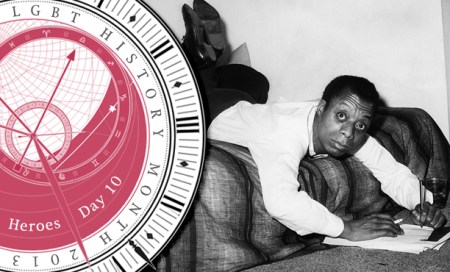LGBT History Month Heroes – Day 10
To celebrate LGBT History Month, 2013, Polari is publishing a daily series of LGBT Heroes, selected by the magazine’s team of writers and special contributors.
James Baldwin – Novelist & Essayist
by Christopher Bryant
………………………………………………………………………………………….
James Baldwin was born in 1924, and he grew up in Harlem with seven younger brothers and sisters. When the Second World War started, the opportunities for a black man in New York City were somewhat improved, and while he worked a series of jobs, Baldwin started to explore both his sexuality and his need to be a writer. He started work on a novel when his stepfather died in 1943. A friend showed the drafts to Richard Wright, author of Native Son (1940), who then recommended Baldwin for a literary grant. Baldwin continued to work various jobs to support his family, and he started to write book reviews that were invariably angry, and aggressive, because he found fault in everything that he read. By the time he was twenty, Baldwin had explored bisexuality, and decided his inclinations were primarily homosexual.
Baldwin did not accept the idea that people could fit neatly into social and political categories, and this defined his writing. In his first major essay ‘Everybody’s Protest Novel’, published in 1949 and written from a self-imposed exile in Paris, he questioned the idea that a minority writer must use his art for political ends. In the same year, in the essay ‘Preservation of Innocence’, he argued that representations of homosexuality in the contemporary novel were not about love but the fear of sex between men: “A novel instantly demands the presence and passion of human beings, who cannot ever be labelled”.
Baldwin’s first novel, Go Tell It On A Mountain, was published in 1953, and as a result of its critical and commercial success he was branded the new “Negro novelist”. And so when he was pressed by his publishers for a new novel, he wrote a love story about a white man who is caught between two lovers – one a woman, the other a man – and set it in the American colony in Paris.
Giovanni’s Room (1956) is an elegiac book, full of pain, about the struggle of one man, David, to come to terms with his sexuality, and how in that struggle another man, Giovanni, is ruined. His American publisher rejected the book. In the mid 1950s, big publishers shied away from stories about homosexuality. In the wake of the McCarthy witch hunts, and a new era of homosexual panic, gay stories went underground to the cheap paperback market, which tended toward the racy, the scandalous, the pulp.
Baldwin would not be deterred, and because of his persistence Michael Joseph published Giovanni’s Room in England. This forced his agent at William Morris, Helen Strauss, to once again submit the book to US publishers. It was finally picked up by Dial Press, at which point Baldwin dropped Strauss who, he later said, had told him to burn the book.
Baldwin continued to weave stories about homosexuality into his fiction, but in his essays he was always the black spokesperson. There were, as a result, two James Baldwins, because in the political struggles of the 1960s his sexuality was pushed to the side. After his death there was, as Christopher Bram notes in Eminent Outlaws, a “degayification” of Baldwin. In the eulogies at his funeral, Toni Morrison, Maya Angelou and Amiri Baraka celebrated him only as a black writer, and not a gay one. His essays were favoured over his fiction, and he was enlisted into one cause, which is an irony considering that in ‘Everybody’s Protest Novel’ he wrote that literature was in danger of being reduced to one note if led by minority politics.
As a writer, Baldwin’s politics went far beyond the face value in which politicians trade. In 1961, Robert Kennedy proposed that the country was changing, and that in perhaps forty years a black man could be elected president. Baldwin questions why black man would want to be president, and continues, “what really exercises my mind is not this hypothetical day on which some other Negro ‘first’ will become the first Negro president. What I am really curious about is just what kind of country he will be president of?” Baldwin wrote as an outsider, but he looked to a future in where the struggles of race and sexuality would no longer be about social and political categories, but about the complexities of being human.






















